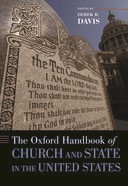 The Oxford Handbook of Church and State in the United States
The Oxford Handbook of Church and State in the United States
Contents
-
-
-
Introduction: Religious Pluralism as the Essential Foundation of America’s Quest for Unity and Order
-
-
-
-
-
-
-
-
Defining Managed Pluralism Defining Managed Pluralism
-
American Managed Pluralism? The Theories American Managed Pluralism? The Theories
-
What the Courts Say What the Courts Say
-
Conclusion Conclusion
-
Endnotes Endnotes
-
Bibliography Bibliography
-
-
-
-
-
-
-
-
-
-
-
-
8 Managed Pluralism: The Emerging Church–State Model in the United States?
Get accessNikolas K. Gvosdev is Professor of National Security Affairs at the U.S. Naval War College and the Jerome E. Levy Chair for Economic Geography. He was the Editor of The National Interest magazine and a Senior Fellow of Strategic Studies at The Nixon Center in Washington, DC. He was also associate director of the J.M. Dawson Institute of Church-State Studies at Baylor University and has served as an adjunct professor at Georgetown, George Washington, and Brown Universities. Dr. Gvosdev is the author or editor of a number of books, including, most recently, Communitarian Foreign Policy: Amitai Etzioni’s Vision, co-author of US Foreign Policy and Defense Strategy: The Rise of an Incidental Superpower, and co-author of Russian Foreign Policy: Interests, Vectors and Sectors. He received his doctorate from St Antony's College, Oxford University, where he studied on a Rhodes Scholarship.
-
Published:02 January 2011
Cite
Abstract
America is defined as a “nation of faith.” Some statesmen claim that it is a republic whose governmental institutions presuppose belief in the Supreme Being and which respects, promotes, and protects religious pluralism. As part of its public diplomacy, the U.S. State Department stresses the connection between American religiosity and freedom. The strong connection between religion and freedom created a religious diversity unmatched by other countries. While the Constitution recognizes religious freedom and religious pluralism, it nonetheless admits the impossibility of absolute pluralism. Within this context, the U.S. Constitution permits limitations for the sake of civic peace, social cohesion, the protection of public safety, and the fundamental rights and freedoms of others. This article discusses how America manages religious pluralism, as well as the meaning of managed pluralism, the theories surrounding it, and the court's standpoint on the issue of managed pluralism.
Sign in
Personal account
- Sign in with email/username & password
- Get email alerts
- Save searches
- Purchase content
- Activate your purchase/trial code
- Add your ORCID iD
Purchase
Our books are available by subscription or purchase to libraries and institutions.
Purchasing information| Month: | Total Views: |
|---|---|
| October 2022 | 3 |
| December 2022 | 2 |
| January 2023 | 4 |
| April 2023 | 2 |
| August 2023 | 1 |
| September 2023 | 1 |
| October 2023 | 1 |
| November 2023 | 1 |
| January 2024 | 3 |
| February 2024 | 3 |
| June 2024 | 1 |
| July 2024 | 3 |
| November 2024 | 2 |
| January 2025 | 1 |
| March 2025 | 1 |
| April 2025 | 5 |
Get help with access
Institutional access
Access to content on Oxford Academic is often provided through institutional subscriptions and purchases. If you are a member of an institution with an active account, you may be able to access content in one of the following ways:
IP based access
Typically, access is provided across an institutional network to a range of IP addresses. This authentication occurs automatically, and it is not possible to sign out of an IP authenticated account.
Sign in through your institution
Choose this option to get remote access when outside your institution. Shibboleth/Open Athens technology is used to provide single sign-on between your institution’s website and Oxford Academic.
If your institution is not listed or you cannot sign in to your institution’s website, please contact your librarian or administrator.
Sign in with a library card
Enter your library card number to sign in. If you cannot sign in, please contact your librarian.
Society Members
Society member access to a journal is achieved in one of the following ways:
Sign in through society site
Many societies offer single sign-on between the society website and Oxford Academic. If you see ‘Sign in through society site’ in the sign in pane within a journal:
If you do not have a society account or have forgotten your username or password, please contact your society.
Sign in using a personal account
Some societies use Oxford Academic personal accounts to provide access to their members. See below.
Personal account
A personal account can be used to get email alerts, save searches, purchase content, and activate subscriptions.
Some societies use Oxford Academic personal accounts to provide access to their members.
Viewing your signed in accounts
Click the account icon in the top right to:
Signed in but can't access content
Oxford Academic is home to a wide variety of products. The institutional subscription may not cover the content that you are trying to access. If you believe you should have access to that content, please contact your librarian.
Institutional account management
For librarians and administrators, your personal account also provides access to institutional account management. Here you will find options to view and activate subscriptions, manage institutional settings and access options, access usage statistics, and more.